Conference Presentations by Ekkarin Tuansiri
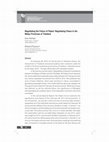
On February 28, 2013, for the first time in Thailand's history, the Government of Thailand announ... more On February 28, 2013, for the first time in Thailand's history, the Government of Thailand announced publicly that it aimed to settle the conflict in the three southernmost provinces of Thailand – otherwise known as the deep South – through official talks with separatist leaders. In the previous annual report, Negotiating a Peaceful Coexistence between the Malays of Patani and the Thai State, the Patani Forum looked at the various attempts to generate peace talks between the Thai government and various separatist movements from 2005 to 2012. We explained why none of these initiatives, which were secretive in nature, succeeded in generating meaningful traction. Two months after this report was released, the Thai government made the February 28 announcement. While the process has faltered, as will be outlined below, the significance of Bangkok acknowledging the political nature of the separatist movement cannot be overstated. In this annual Special Report, the Patani Forum examines the significance and impact of the February 28, 2013 announcement. In the Introduction, we provide a brief overview of previous talks between separatists and Thai authorities and discuss what makes the February 28 announcement different from previous iterations of talks. In Section I, we look at insurgency activity leading up to the announcement and explore why, a year later, the peace process has come to a virtual standstill. We begin this examination with the so-called Mayo Operation of July 2012, which was caught on CCTV, and end with the Bacho Operation in February 2013, the same month the official peace talks were announced. In Section II, we focus on the peace process itself, discussing key meetings and exploring their connection to insurgent activity on the ground. We also discuss the
สำรวจประเด็นงานศึกษาประเด็นการเมืองจังหวัดชายแดนภาคใต้
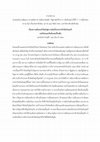
ในขณะที่กระแสประชาธิปไตยทั่วโลกกำลังถดถอย ในทางกลับกันกระแสความคิดทางการเมืองแบบขวาหันได้เติบโตอย... more ในขณะที่กระแสประชาธิปไตยทั่วโลกกำลังถดถอย ในทางกลับกันกระแสความคิดทางการเมืองแบบขวาหันได้เติบโตอย่างมีนัยสำคัญ สำหรับประเทศตุรกี เส้นทางประชาธิปไตยหลังเหตุการณ์รัฐประหารล้มเหลวเมื่อวันที่ 15 กรกฎาคม 2016 ก็ประสบปัญหาการไม่เป็นประชาธิปไตยมากขึ้นเช่นเดียวกัน ผลการประเมินของ Freedom House ในปี 2018 จัดอันดับให้ตุรกีเป็นประเทศที่ไม่มีเสรีภาพเป็นครั้งแรกในรอบ 10 กว่าปี นอกจากนั้น สถานการณ์ดังกล่าวยังไม่มีท่าทีว่าจะดีขึ้นหลังจากรัฐบาลภายใต้การนำของพรรคเพื่อความยุติธรรมและการพัฒนาได้ขยายภาวะฉุกเฉินในการบริหารประเทศจนถึงปัจจุบัน (กุมภาพันธ์ 2018) แต่กระนั้นตุรกีก็กำลังเผชิญกับปัญหามากมายหลายด้าน อาทิเช่น ภัยคุกคามจากรัฐคู่ขนาน กลุ่มรัฐอิสลาม ปัญหาชาวเคิร์ด และผู้ลี้ภัยชาวซีเรีย เป็นต้น คำถามหลักที่บทความนี้ต้องการศึกษาคือ เราสามารถคิดและอธิบายเกี่ยวกับประชาธิปไตยในตุรกียุคหลัง 15 กรกฎาคม 2016 อย่างไรได้บ้าง? หลังจากที่ฉายภาพเส้นทางประชาธิปไตยในตุรกีตั้งแต่ 1950 บทความนี้นำเสนอว่าการทำความเข้าใจปรากฏการณ์ประชาธิปไตยถดถอยในตุรกีผ่านกรอบการทำให้เป็นประชาธิปไตยมีข้อจำกัด (ไม่เพียงพอต่อการเข้าใจพลวัตทางการเมืองในตุรกี) เนื่องจากการละเลยกระบวนการทำให้ความท้าทายต่าง ๆ กลายเป็นภัยความมั่นคงแห่งชาติ เมื่อเป็นเช่นนั้น คำถามเกี่ยวกับลักษณะของการเมืองที่พึ่งเป็นควรมีหน้าตาอย่างไรจึงมีความสำคัญ ตุรกีมีทางเลือกในการจัดการปัญหาความมั่นคงดังกล่าวด้วยลักษณะการเมืองสองแบบ ลักษณะแรกคือการเมืองแบบปรกติและลักษณะที่สองคือการเมืองในภาวะยกเว้น ดั่งที่กำลังเป็นอยู่ในปัจจุบัน การเมืองในลักษณะที่สอง (แบบความมั่นคงภิวัฒน์) ซึ่งไม่เป็นมิตรกับการสร้างประชาธิปไตยคือทางเลือกและลักษณะเด่นของการเมืองตุรกีในการจัดการปัญหาที่สำคัญในปัจจุบัน หากเป็นเช่นนั้นแล้ว ทางออกขั้นแรกของความไม่เป็นประชาธิปไตยในตุรกีเห็นคงจะเป็นการทำให้ประเด็นความมั่นคงต่าง ๆ กลับมาอยู่ในวาระทางการเมืองแบบปรกติ มิเช่นนั้นแล้วการถกเถียงเรื่องการสร้างประชาธิปไตยในตุรกีก็หาได้มีนัยสำคัญไม่
Books by Ekkarin Tuansiri
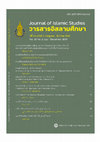
Journal of Islamic Studies, 2019
งานวิจัยฉบับนี้มุ่งศึกษาภววิทยาของความสัมพันธ์ระหว่างชาวพุทธและมุสลิมในประเทศไทยระหว่างปี 2018-20... more งานวิจัยฉบับนี้มุ่งศึกษาภววิทยาของความสัมพันธ์ระหว่างชาวพุทธและมุสลิมในประเทศไทยระหว่างปี 2018-2019 โดยเก็บข้อมูลจากการประชุมเฉพาะกลุ่มในสี่ภูมิภาคทั้งประเทศ งานฉบับนี้ชี้ให้เห็นว่าความขัดแย้งที่เพิ่มขึ้นระหว่างกลุ่มชาวพุทธและมุสลิมเป็นความท้าทายแห่งทศวรรษนี้ที่ต้องได้รับการเฝ้าระวังและควบคุมอย่างเป็นระบบ ความสัมพันธ์ระหว่างกลุ่มคนเป็นสิ่งที่สังคมสร้างขึ้นผ่านการปฏิสัมพันธ์และการรับรู้เรื่องราวระหว่างเพื่อนร่วมชาติที่นับถือศาสนาและมีเชื้อชาติที่แตกต่างกัน ความสัมพันธ์ของกลุ่มอาจจะเปลี่ยนแปลงตามกาลเวลาและสถานที่ จากความร่วมมือไปสู่ความขัดแย้งและความรุนแรง ในช่วงระยะเวลากว่าหนึ่งทศวรรษที่ผ่านมา ความสัมพันธ์ระหว่างชาวพุทธและมุสลิมโดยรวมเปลี่ยนแปลงไปในทิศทางที่น่าเป็นห่วง เช่น ภาคใต้ตอนล่างไม่เพียงประสบปัญหาความรุนแรงในแนวดิ่งเท่านั้นแต่ยังขยายทิศทางไปสู่ความขัดแย้งแนวระนาบด้วย ในขณะที่ ภาคเหนือและอีสานต่างก็มีการต่อต้านสัญลักษณ์ของความเป็นมุสลิมอย่างตื่นตัว เช่นเดียวกับในภาคใต้ตอนบนและภาคกลางที่มีการเรียกร้องการแสดงอัตลักษณ์ความเป็นมุสลิมเพิ่มขึ้น งานวิจัยนี้จะอธิบายว่าเหตุใดความสัมพันธ์ดังกล่าวจึงมีความเปราะบางมากขึ้น พื้นที่ใดที่มีความน่าเป็นห่วงมากที่สุด และความขัดแย้งมีนัยยะสัมพันธ์อย่างไรกับพื้นที่แต่ละพื้นที่
“โครงการประชาหารือสู่สันติภาพชายแดนใต้” เป็นการทำงาน ร่วมกันของชุมชนภาคประชาสังคมในสามจังหวัดชายแ... more “โครงการประชาหารือสู่สันติภาพชายแดนใต้” เป็นการทำงาน ร่วมกันของชุมชนภาคประชาสังคมในสามจังหวัดชายแดนภาคใต้ โดยมี มูลนิธิเอเชียเป็นผู้สนับสนุนด้านงบประมาณและทักษะต่างๆ เพื่อบรรลุเป้าหมาย ในการเสริมสร้างการมีส่วนร่วมของชุมชนในการแก้ปัญหาต่างๆ ท่ีเกิดขึ้นใน สามจังหวัดชายแดนภาคใต้ โครงการฯ ได้นำรูปแบบการ “จัดเวทีประชาหารือ” ในการจัดทำเวทีและเสนอออกมาในรูปแบบหนังสือ

This study was divided into two phases with each adopting a slightly different set of methodologi... more This study was divided into two phases with each adopting a slightly different set of methodologies. During the first phase (funded by the Canadian Embassy in Bangkok), Patani Forum conducted five one-day workshops with both Buddhists and Muslims in Thailand’s four regions to lay the groundwork for deeper research into Buddhist-Muslim relations and gauge the extent of growing anti-Islam sentiment in the country. The cities included Songkhla, Udon Thani, Chiang Mai and Ayutthaya. The workshops were carried out with the assistance from local facilitators leading open discussions with small groups of Muslims and Buddhists separately. Community leaders, facilitators and members of the Patani Forum network were crucial in the recruitment of participants, who represented a wide and diverse spectrum of Thai society, from civil servants, health workers to homemakers and students. The number of participants varied per session but generally comprised between 12-16 local residents. Except for the first workshop, different facilitators were used for both the morning and afternoon sessions. Patani Forum met with facilitators before each workshop to discuss the objectives and format of the sessions. The main purpose of the sessions was to gauge participants’ perception and understanding of Islam and Muslims.
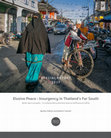
The ruling National Council for Peace and Order (NCPO) inherited a mess of a challenge as they de... more The ruling National Council for Peace and Order (NCPO) inherited a mess of a challenge as they decided to continue with the peace initiative with the Patani Malay separatists that was initiated by the government of Yingluck Shinawatra, the administration that they had ousted from power in May 2014. The Yingluck administration had kept the military in the dark during the planning and inception process of the peace initiative, launched in Kuala Lumpur on February 28, 2013.
When it was time to sit down with the separatists, Yingluck appointed her trusted bureaucrats to the negotiating table, thus, further alienating the military.
The same treatment was given to the Barisan Revolusi Nasional (BRN), the one long-standing separatist movement that controls virtually all militants on the ground. They were alsokept in the dark and caught off-guard when the process was formally launched. Hasan Taib was designated as the “liaison” by Thailand and Malaysia. Hasan was assigned to convince all other long-standing separatist groups, especially members of the secretive BRN ruling council, the Dewan Pimpinan Parti (DPP), to come to the negotiating table. By the end of 2013, when it was clear that the BRN would not give in for the demands to join the talks, Hasan decided to throw in the towel and went incommunicado. This coincided with “Shutdown Bangkok” -- massive street protests by anti-Shinawatra forces, which forced the Yingluck government to go on retreat. The protest also set the stage for a coup in May 2014. As a result, conflict resolution efforts for Thailand’s far South had to be shelved until the ruling junta had decided how to handle an initiative that they did not start in the first place and a conflict that they could not ignore.
Papers by Ekkarin Tuansiri
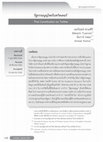
King Prajadhipok's Institute Journal , 2023
Due to the constitution of the Kingdom of Thailand B.E. 2560 (2017) sets many rules that are diff... more Due to the constitution of the Kingdom of Thailand B.E. 2560 (2017) sets many rules that are different from the constitution of the Kingdom of Thailand B.E. 2540 (1997) and the constitution of the Kingdom of Thailand B.E. 2550 (2007). Therefore, the study of Thai politics after the Thailand military coup in 2014 cannot overlook the significance of the constitution of the Kingdom of Thailand B.E. 2560 (2017). This study aims to examine the relevancy of the constitution of the Kingdom of Thailand B.E. 2560 (2017) as the determinant of Thailand’s political ecosystem. Nonetheless, after the 2019 Thailand general election, political environment during that time reinforced political parties and activists to campaign about the amendment of the constitution. As a result, the widespread interest in the amendment had increased significantly. This study uses social media listening tool (Zocial Eyes) to collect data from Twitter API for Academic Research, from 7 September 2016 to 31 December 2020, and selects three keywords; constitution, #whatthesenatorfor, and #สสร (constituent assembly) in order to examine the popular interest on the study. The findings show three main points 1) the keyword of “constitution” is the most comfortable word connecting between political events and the trend of popular interests over the constitution from twitter users, 2) the keyword of #whatthesenatorfor will appear significantly when there were the joint sittings of the national assembly which was the reaction on the senator’s role for opposing the amendment, and 3) people were not interested in the role of #สสร (constituent assembly). Moreover, the proposal for the amendment from people’s campaign through public participation had significantly sparked popular interest over the issue.

A Fragile Society: Buddhist-Muslims Relations in Thailand in 2018-2019
This research project examines an ontology of Buddhist-Muslim relations in Thai society between 2... more This research project examines an ontology of Buddhist-Muslim relations in Thai society between 2018- and 2019. A focus group and in-depth interview were used to collect data from 4 regions of the country during July-December 2018. It explains why such relations turned more fragile, which areas are the most dangerous, and how the conflict is relevant to different types of area. It demonstrates that the tensions between Buddhists and Muslims in the society are seen as a challenge of the 2010s, which needs to be monitored systematically. Such relations had been socially constructed through interactions between the compatriots of different religions and ethnicities, and can change with time and location, from cooperation to confrontation and violence. In this decade, such relations, however, have changed in a negative way. Examples are a change of direction from vertical violence to the horizontal conflict in the deep south, active protests of Buddhists against Muslims in the North and...
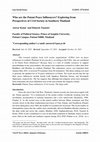
Asia Social Issues
This research explores local civil society organizations’ (CSOs) view on peace influencers in sou... more This research explores local civil society organizations’ (CSOs) view on peace influencers in southern Thailand. Its key puzzle is, according to the CSOs, who are considered to be Patani Peace Influencers? Because there is a lack of reliable resources to support peacebuilding on key peacemakers, this project uses exploratory research to collect data from Buddhists and Muslims in southern Thailand. The exploratory survey was launched from January-May 2021; it received 59 nominees from 48 nominators. The dense ranking was used to generate the updated list of 10 peace influencers in Patani. The result unveils that the top three peace influencers include Ismail Lutfi Japakiya, Rukchart Suwan, and Srisompob Jitpiromsri, respectively. The list suggests that although non-religious actors have primarily been nominated, the most influential actor in the area remains the religious scholar.

เอเชียพิจาร ศูนย์ศึกษาเอเชีย คณะรัฐศาสตร์ มหาวิทยาลัยรามคำแหง, 2018
ภูมิทัศน์ทางการเมืองในปัจจุบันกาลังอยู่ในช่วงที่กระแสประชาธิปไตยทั่วโลกกาลังถดถอย ในขณะเดียวกันกร... more ภูมิทัศน์ทางการเมืองในปัจจุบันกาลังอยู่ในช่วงที่กระแสประชาธิปไตยทั่วโลกกาลังถดถอย ในขณะเดียวกันกระแสความคิด ทางการเมืองแบบขวาหันก็ได้เติบโตอย่างมีนัยสาคัญ สาหรับประเทศตุรกี เส้นทางประชาธิปไตยหลังเหตุการณ์รัฐประหารล้มเหลว เมื่อวันที่ 15 กรกฎาคม ค.ศ. 2016 ก็ประสบปัญหาการไม่เป็นประชาธิปไตยมากขึ้นเช่นเดียวกัน ผลการประเมินของ Freedom House ในปี 2018 จัดอันดับให้ตุรกีเป็นประเทศที่ไม่มีเสรีภาพ เป็นครั้งแรกในรอบ 10 กว่าปี นอกจากนั้น สถานการณ์ดังกล่าวยังไม่มีท่าทีว่าจะดีขึ้นหลังจากรัฐบาลภายใต้การนาของพรรคเพื่อความยุติธรรมและการพัฒนาได้ขยายภาวะฉุกเฉินในการบริหารประเทศจนถึงปัจจุบัน (เมษายน ค.ศ.2018) แต่กระนั้นตุรกีก็กาลังเผชิญกับปัญหามากมายหลายด้าน อาทิเช่น ภัยคุกคามจากรัฐคู่ขนาน กลุ่มรัฐอิสลาม ปัญหา ชาวเคิร์ด และผู้ลี้ภัยชาวซีเรีย เป็นต้น คาถามหลักที่บทความนี้ต้องการ ศึกษา คือ เราสามารถคิดและอธิบายเกี่ยวกับประชาธิปไตยในตุรกี ยุคหลัง 15 กรกฎาคม 2016 อย่างไรได้บ้าง? หลังจากที่ฉายภาพเส้นทางประชาธิปไตยในตุรกีตั้งแต่ ค.ศ.1950 บทความนี้นาเสนอว่าการทา ความเข้าใจปรากฏการณ์ประชาธิปไตยถดถอยในตุรกีผ่านกรอบการทาให้เป็นประชาธิปไตยมีข้อจากัด (ไม่เพียงพอต่อการเข้าใจพลวัตทางการเมืองในตุรกี) เนื่องจากการละเลยกระบวนการทาให้ความท้าทาย ต่าง ๆ กลายเป็นภัยความมั่นคงแห่งชาติ เมื่อเป็นเช่นนั้น คาถามเกี่ยว กับลักษณะของการเมืองที่พึงเป็นควรมีหน้าตาอย่างไรจึงมีความสาคัญ ตุรกีมีทางเลือกในการจัดการปัญหาความมั่นคงดังกล่าวด้วยลักษณะการเมืองสองแบบ ลักษณะแรกคือการเมืองแบบปรกติและลักษณะที่สองคือ การเมืองในภาวะยกเว้นดั่งที่กาลังเป็นอยู่ในปัจจุบัน การเมือง ในลักษณะที่สอง (แบบความมั่นคงภิวัฒน์) ซึ่งไม่เป็นมิตรกับการสร้างประชาธิปไตยคือทางเลือกและลักษณะเด่นของการเมืองตุรกี ในการจัดการปัญหาที่สาคัญในปัจจุบัน หากเป็นเช่นนั้นแล้ว ทางออก ขั้นแรกของความไม่เป็นประชาธิปไตยในตุรกีเห็นคงจะเป็นการทาให้ประเด็นความมั่นคงต่าง ๆ กลับมาอยู่ในวาระทางการเมืองแบบปรกติ มิเช่นนั้นแล้วการถกเถียงเรื่องการหยั่งรากลึกของประชาธิปไตยในตุรกีก็หาได้มีนัยสาคัญไม่
“ประชาธิปไตย” กลายเป็นคำประกาศิตของสังคม
การเมืองในโลกสมัยใหม่และถูกนำมา “ตีความ” ที่
หลากหลายตั้... more “ประชาธิปไตย” กลายเป็นคำประกาศิตของสังคม
การเมืองในโลกสมัยใหม่และถูกนำมา “ตีความ” ที่
หลากหลายตั้งแต่เรียบง่ายจนกระทั่งซับซ้อนมากที่สุด
นับตั้งแต่อดีตจนถึงปัจจุบัน บทความนี้มีวัตถุประสงค์
เพื่อสำรวจปัญญาชนมุสลิมกับประชาธิปไตย โดย
พิจารณาผ่านงานเขียน บทความวิชาการของกลุ่ม
ปัญญาชนมุสลิม บทความนี้แบ่งเป็น 3 ส่วน ส่วนที่หนึ่ง
นำเสนอกรอบโครงการ กรอบแนวคิดในการอธิบาย
แนวคิดเรื่องประชาธิปไตยและอิสลาม และกรอบ
แนวคิดอธิบายปัจจัยที่มีอิทธิพลในการกำหนด และก่อ
ให้เกิดการเปลี่ยนแปลงมโนทัศน์ของปัญญาชนมุสลิม
ในประเทศไทย ส่วนที่สอง อธิบายภาพปัญญาชนมุสลิม
และบทบาททางการเมืองของพวกเขาหลังยุค 14 ตุลา
2516 และ ส่วนที่สามแสดงความคิดรวบยอดของ
กรอบมโนทัศน์ว่าด้วยเรื่องประชาธิปไตยของกลุ่ม
ปัญญาชนมุสลิม

This article places an emphasis on the “realities”
of Muslims and Muslim society more than the de... more This article places an emphasis on the “realities”
of Muslims and Muslim society more than the debate
about being Islamic or not. It focuses on ethnic
diversity of the Malay Muslim which has been touched
on lately given the complexity of the Muslim society.
This article is an attempt to discuss diversity in Muslim
society in SBPs in terms of its way of thinking,
subculture in daily life, social status, anticipation of
the future, and adaptation to cope with modernity as
well as global transformation as a result of Western
globalization and globalization in the Arab world of
people of different ages and its dynamism. It is an
effort to shed light on and respond to the questions
already raised as to how the differences play any role
in the relations that affect the incumbent violent
situation. It is an attempt to argue that the phenomenal
differences can be attributed to both the past and
present globalizations. Also, the differences are
useful for discovering traces of social conflicts among
the Malay Muslim. The article argued that such
conflicts are so natural and intrinsic to the existing
interconnectedness within the Muslim society, they
have worryingly multiplied themselves and are
compounded by the modern nation state mechanisms.
As people are prompted to take side, it has led to
mutual suspicion in the SBP Malay society. In
particular, the credibility and legitimacy of local
institutions has been eroded and it has contributed to
the intensification the causes of violent conflicts in the
area.
Published Articles by Ekkarin Tuansiri
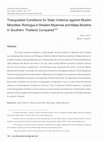
Journal of Social Sciences , 2022
This study examines variations in state-Muslim minority relations in Myanmar and Thailan... more This study examines variations in state-Muslim minority relations in Myanmar and Thailand by comparing state violence on Rohingya in Rakhine State of Myanmar and that on Malay-Muslims in southern Thailand. Although Myanmar and Thailand share the common feature of Theravada Buddhism,state relations with Muslim minorities in the two cases exhibit different outcomes: extreme violence and low level violence, respectively. The Rohingya case represents the former, while the Malay-Muslim case the latter. Essentially, this study aims to identify the diverging conditions. The findings show that the diverging outcomes depended on differences in the degree of exclusionary state perception, influence of Buddhist nationalism, and weakness of Muslim minorities. The paper also shows that when these three conditions are formed in a triangulated configuration, then it is more likely that extreme violence on ethnoreligious minorities is imminent. Thus, it proposes that the absence on presence of the triangulated conditions can be used as an early warning mechanism for monitoring the state’s extreme violence against ethnoreligious minorities in Southeast Asia, especially on the Malay-Muslims in southern Thailand.


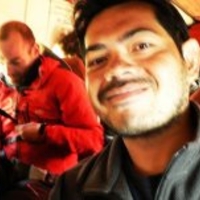




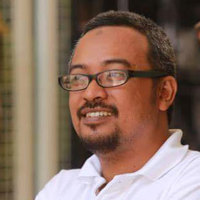


Uploads
Conference Presentations by Ekkarin Tuansiri
Books by Ekkarin Tuansiri
When it was time to sit down with the separatists, Yingluck appointed her trusted bureaucrats to the negotiating table, thus, further alienating the military.
The same treatment was given to the Barisan Revolusi Nasional (BRN), the one long-standing separatist movement that controls virtually all militants on the ground. They were alsokept in the dark and caught off-guard when the process was formally launched. Hasan Taib was designated as the “liaison” by Thailand and Malaysia. Hasan was assigned to convince all other long-standing separatist groups, especially members of the secretive BRN ruling council, the Dewan Pimpinan Parti (DPP), to come to the negotiating table. By the end of 2013, when it was clear that the BRN would not give in for the demands to join the talks, Hasan decided to throw in the towel and went incommunicado. This coincided with “Shutdown Bangkok” -- massive street protests by anti-Shinawatra forces, which forced the Yingluck government to go on retreat. The protest also set the stage for a coup in May 2014. As a result, conflict resolution efforts for Thailand’s far South had to be shelved until the ruling junta had decided how to handle an initiative that they did not start in the first place and a conflict that they could not ignore.
Papers by Ekkarin Tuansiri
การเมืองในโลกสมัยใหม่และถูกนำมา “ตีความ” ที่
หลากหลายตั้งแต่เรียบง่ายจนกระทั่งซับซ้อนมากที่สุด
นับตั้งแต่อดีตจนถึงปัจจุบัน บทความนี้มีวัตถุประสงค์
เพื่อสำรวจปัญญาชนมุสลิมกับประชาธิปไตย โดย
พิจารณาผ่านงานเขียน บทความวิชาการของกลุ่ม
ปัญญาชนมุสลิม บทความนี้แบ่งเป็น 3 ส่วน ส่วนที่หนึ่ง
นำเสนอกรอบโครงการ กรอบแนวคิดในการอธิบาย
แนวคิดเรื่องประชาธิปไตยและอิสลาม และกรอบ
แนวคิดอธิบายปัจจัยที่มีอิทธิพลในการกำหนด และก่อ
ให้เกิดการเปลี่ยนแปลงมโนทัศน์ของปัญญาชนมุสลิม
ในประเทศไทย ส่วนที่สอง อธิบายภาพปัญญาชนมุสลิม
และบทบาททางการเมืองของพวกเขาหลังยุค 14 ตุลา
2516 และ ส่วนที่สามแสดงความคิดรวบยอดของ
กรอบมโนทัศน์ว่าด้วยเรื่องประชาธิปไตยของกลุ่ม
ปัญญาชนมุสลิม
of Muslims and Muslim society more than the debate
about being Islamic or not. It focuses on ethnic
diversity of the Malay Muslim which has been touched
on lately given the complexity of the Muslim society.
This article is an attempt to discuss diversity in Muslim
society in SBPs in terms of its way of thinking,
subculture in daily life, social status, anticipation of
the future, and adaptation to cope with modernity as
well as global transformation as a result of Western
globalization and globalization in the Arab world of
people of different ages and its dynamism. It is an
effort to shed light on and respond to the questions
already raised as to how the differences play any role
in the relations that affect the incumbent violent
situation. It is an attempt to argue that the phenomenal
differences can be attributed to both the past and
present globalizations. Also, the differences are
useful for discovering traces of social conflicts among
the Malay Muslim. The article argued that such
conflicts are so natural and intrinsic to the existing
interconnectedness within the Muslim society, they
have worryingly multiplied themselves and are
compounded by the modern nation state mechanisms.
As people are prompted to take side, it has led to
mutual suspicion in the SBP Malay society. In
particular, the credibility and legitimacy of local
institutions has been eroded and it has contributed to
the intensification the causes of violent conflicts in the
area.
Published Articles by Ekkarin Tuansiri
When it was time to sit down with the separatists, Yingluck appointed her trusted bureaucrats to the negotiating table, thus, further alienating the military.
The same treatment was given to the Barisan Revolusi Nasional (BRN), the one long-standing separatist movement that controls virtually all militants on the ground. They were alsokept in the dark and caught off-guard when the process was formally launched. Hasan Taib was designated as the “liaison” by Thailand and Malaysia. Hasan was assigned to convince all other long-standing separatist groups, especially members of the secretive BRN ruling council, the Dewan Pimpinan Parti (DPP), to come to the negotiating table. By the end of 2013, when it was clear that the BRN would not give in for the demands to join the talks, Hasan decided to throw in the towel and went incommunicado. This coincided with “Shutdown Bangkok” -- massive street protests by anti-Shinawatra forces, which forced the Yingluck government to go on retreat. The protest also set the stage for a coup in May 2014. As a result, conflict resolution efforts for Thailand’s far South had to be shelved until the ruling junta had decided how to handle an initiative that they did not start in the first place and a conflict that they could not ignore.
การเมืองในโลกสมัยใหม่และถูกนำมา “ตีความ” ที่
หลากหลายตั้งแต่เรียบง่ายจนกระทั่งซับซ้อนมากที่สุด
นับตั้งแต่อดีตจนถึงปัจจุบัน บทความนี้มีวัตถุประสงค์
เพื่อสำรวจปัญญาชนมุสลิมกับประชาธิปไตย โดย
พิจารณาผ่านงานเขียน บทความวิชาการของกลุ่ม
ปัญญาชนมุสลิม บทความนี้แบ่งเป็น 3 ส่วน ส่วนที่หนึ่ง
นำเสนอกรอบโครงการ กรอบแนวคิดในการอธิบาย
แนวคิดเรื่องประชาธิปไตยและอิสลาม และกรอบ
แนวคิดอธิบายปัจจัยที่มีอิทธิพลในการกำหนด และก่อ
ให้เกิดการเปลี่ยนแปลงมโนทัศน์ของปัญญาชนมุสลิม
ในประเทศไทย ส่วนที่สอง อธิบายภาพปัญญาชนมุสลิม
และบทบาททางการเมืองของพวกเขาหลังยุค 14 ตุลา
2516 และ ส่วนที่สามแสดงความคิดรวบยอดของ
กรอบมโนทัศน์ว่าด้วยเรื่องประชาธิปไตยของกลุ่ม
ปัญญาชนมุสลิม
of Muslims and Muslim society more than the debate
about being Islamic or not. It focuses on ethnic
diversity of the Malay Muslim which has been touched
on lately given the complexity of the Muslim society.
This article is an attempt to discuss diversity in Muslim
society in SBPs in terms of its way of thinking,
subculture in daily life, social status, anticipation of
the future, and adaptation to cope with modernity as
well as global transformation as a result of Western
globalization and globalization in the Arab world of
people of different ages and its dynamism. It is an
effort to shed light on and respond to the questions
already raised as to how the differences play any role
in the relations that affect the incumbent violent
situation. It is an attempt to argue that the phenomenal
differences can be attributed to both the past and
present globalizations. Also, the differences are
useful for discovering traces of social conflicts among
the Malay Muslim. The article argued that such
conflicts are so natural and intrinsic to the existing
interconnectedness within the Muslim society, they
have worryingly multiplied themselves and are
compounded by the modern nation state mechanisms.
As people are prompted to take side, it has led to
mutual suspicion in the SBP Malay society. In
particular, the credibility and legitimacy of local
institutions has been eroded and it has contributed to
the intensification the causes of violent conflicts in the
area.